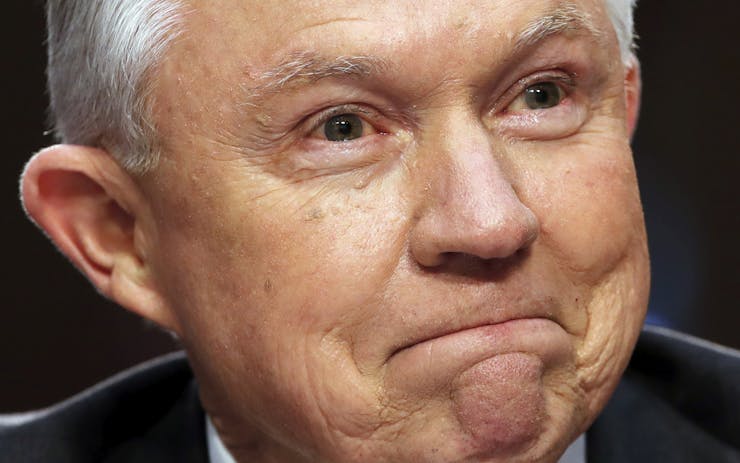Attorney General Jeff Sessions, following up on his revival of mandatory minimum sentences and the federal use of private for-profit prisons, today announced plans to ramp up the widely discredited practice of civil asset forfeiture.
Speaking at a National District Attorneys Association meeting in Minneapolis, Sessions said that he and the Justice Department plan on reviving the controversial practice of taking assets from citizens who haven’t been convicted or even charged with a crime.
“We hope to issue this week a new directive on asset forfeiture — especially for drug traffickers,” Sessions said in prepared remarks.
Civil asset forfeiture is a concept that has its roots in ancient British maritime law, but was widely introduced in the United States in the 1980s, when federal and state authorities used provisions of the 1984 Comprehensive Crime Control Act and other measures to strip ill-gotten gains from big-time drug traffickers.
In the decades since, the practice has trickled down into policing at nearly every level, and has resulting in notorious abuses in states across the nation. In 2014, the Washington Post ran a six-part investigative series that documented the ways in which civil asset forfeiture was “turning our police forces into present-day Robin Hoods.”
As the site, Reason posted, asset forfeiture was a prized commodity used by law enforcement in the battle against organized drug cartels in the 1980s. In recent years, both liberal and conservative groups have called for an end to the practice, or at least a major effort at reform. Giving law enforcement officials a profit incentive, coupled with a lack of oversight, has led to innocent average citizens getting their property seized with little avenue for redress.
Soon after Sessions speech on Monday, Republican Sen. Mike Lee of Utah cautioned the DOJ to not overstep its bounds. According to Buzzfeed News, Lee noted that Justice Clarence Thomas wanted the Supreme Court to hear a case challenging asset forfeiture.
This new policy could directly affect the cannabis industry, which is legal in many states but remains against federal law nationwide. As Leafly Associate Editor Ben Adlin pointed out on Twitter, nothing in the text of Rohrabacher-Blumenauer Amendment—the legislation that prohibits the DOJ from spending funds to interfere with state medical marijuana laws—prohibits the DOJ from seizing the assets of cannabis businesses.
An observation: Nothing in the text of Rohrabacher-Blumenauer on its face prohibits DOJ from seizing assets of cannabis businesses. pic.twitter.com/srtkWFkvAM
— Ben Adlin (@badlin) July 17, 2017
Under President Obama, then-Attorney General Eric Holder scaled back the federal asset forfeiture program that split the proceeds with state and local police. The new Justice Department policy, if and when it’s officially announced, would presumably override that 2015 reform.





